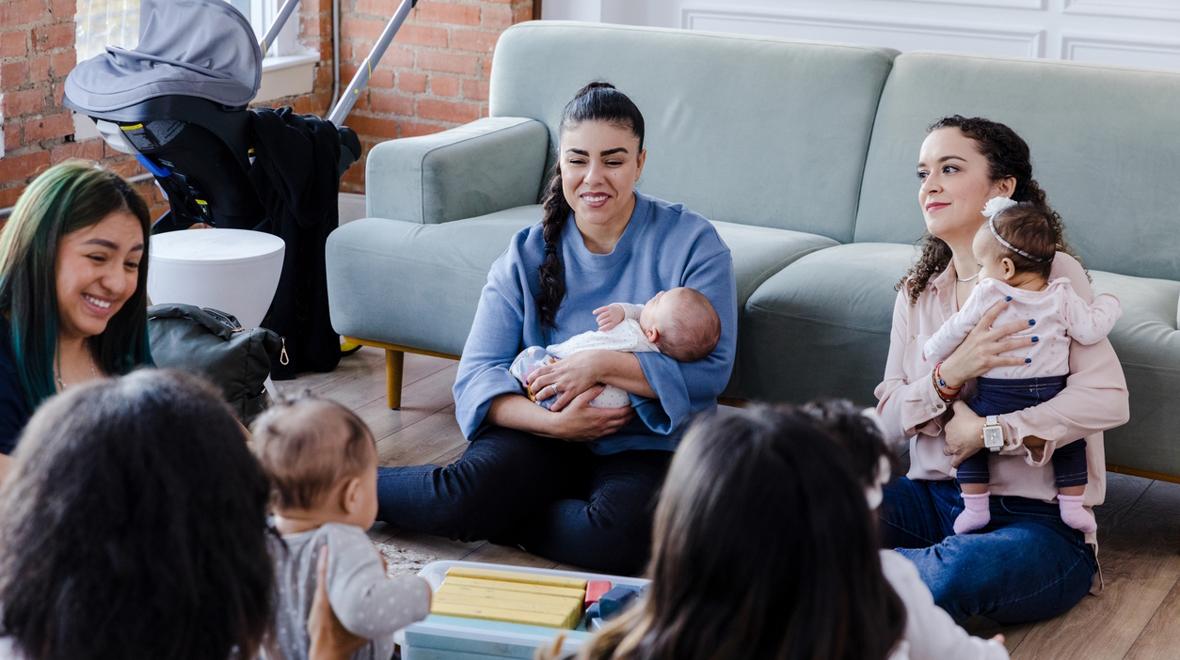
Photo:
iStock
One of my favorite things about spring is watching all the families out walking as their toddlers experience the season for the first time. I look forward to seeing the babies in their strollers blinking under the unfamiliar sunshine as much as I do to seeing the cherry blossoms and magnolias. But every springtime, I wonder — where were all these babies hiding during the winter?
“We live in the Pacific Northwest. It gets darker earlier, and the days are wet and gray. All that combined with the already very isolating time of parenthood, especially in the newborn stages, is just really difficult. And I think oftentimes, when folks are in those early newborn stages, they’re so tethered to the home,” says Patricia Andre-Edgar, communications and marketing director for PEPS. The early days of parenting are hard, even if it’s not your first time. And in the winter, the challenges of round-the-clock childcare become even harder. It’s no wonder that new moms rarely run into each other at the park or walking around the neighborhood in midwinter. But when seasonal affective disorder piles on top of postpartum depression, it becomes even more important to maintain outside connections.
Fortunately, PEPS has been helping parents connect with each other for decades. The supportive community that grows out of PEPS Groups is always valuable, but even more so in winter. That was certainly the experience of one mom who joined a PEPS Newborn Group in February. She shares, “My PEPS meeting was the first time I left my house. That was the first time I ever took Ella outside besides doctor appointments at that point.”
PEPS Newborn Groups bring cohorts of five–10 families together for 12 weekly sessions led by trained facilitators. The groups work through a curriculum, tackling a different developmental or parenting topic each week. PEPS recently updated the Developmental Moments guide that walks families through typical developmental milestones and stages. But while parents learn a lot about infant development, the main goal is creating a space where parents can talk with other parents who are also in the throes of parenting an infant. These conversations help parents normalize their challenges while celebrating each other’s successes.
“We share highs and lows. It’s not all doom and gloom, right? We definitely encourage people to talk about what’s going really well and what are some successes, and that helps them build parenting confidence,” says Andre-Edgar.
“PEPS helped me do the things that were scary at the time — go for a stroller walk, take your kid to the mall — things that were very normal. But when it’s your first [child] and you’re kind of lost, you need help,” says Ella’s mom.
For many parents, getting out of the house and seeing other parents in person is the best thing about PEPS, and PEPS groups are often neighborhood-based to make continuing those connections after the program ends more convenient.
But sometimes, a neighborhood group isn’t possible, and for some families, health or transportation issues or other caregiving responsibilities are very real tethers to the home. For these situations, PEPS offers virtual programs. Participant feedback about what works best has led PEPS to develop affinity groups that address the specific needs of LGBTQIA+ families, single parents, working moms, and parents of teens. Thanks to a community partnership with ChildStrive and Sistema Escolar, there are Spanish-language PEPS groups.
To be as accessible as possible, all programs offer flexible pricing. The curriculum has been reviewed with an antibias lens for LGBTQIA+, ableism, language, and cultural biases. While these iterative updates continue to make the program materials more inclusive, the materials are far less important than the participants. Parent-to-parent support is the heart of all PEPS programs.
“We have the surgeon general putting out this recent advisory about how parenting is really, really hard. And there’s a lot of stressors. And there’s a lack of support on a community level and on a systemic level,” says Andre-Edgar. Especially in winter, when parents are facing all these challenges and it’s cold and dark on top of everything else, “That’s where the PEPS Groups really help to support parents. It brings them together. It gives them a reason to have that interaction. It allows them opportunities to build that community and connection and realize that they’re not alone in how they’re feeling.”
“Parents Under Pressure,” the recent surgeon general advisory referred to, includes specific recommendations that different groups of stakeholders can take to ease the pressure that is creating such a strain on parental mental health. The top recommendations for community action read like a description of PEPS programs:
- Open a dialogue about parental stress, mental health and well-being in culturally appropriate ways.
- Equip parents and caregivers with resources to address parental stressors and connect to crucial support services.
- Create opportunities to cultivate supportive social connections among parents and caregivers.
“Parenting is year-round. It’s every day, every minute of your life,” says Andre-Edgar. Whether your due date is in the deep dark of December or the brightening days of spring, PEPS is there to help parents help each other through the challenges.
More support for Puget Sound parents: |











